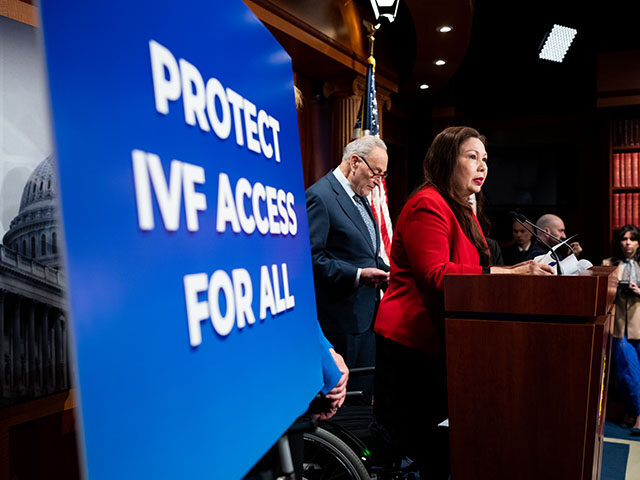Sens. Tammy Duckworth (D-IL) and Patty Murray (D-WA) said they will try to force a vote Wednesday for a bill that would shield in vitro fertilization (IVF), in response to the Alabama Supreme Court decision ruling that frozen embryos are considered unborn children under state law.
At least three clinics in Alabama have reportedly paused offering IVF since the state Supreme Court issued its ruling, which stated that anyone who destroys a frozen embryo may be held liable under the state’s Wrongful Death of a Minor Act — a law that has historically applied to born and unborn children.
Duckworth, who has had two children by IVF, is effectively backing Senate Republicans into a corner to see if they will support her bill, all while Democrats and President Joe Biden use the decision as part of their pro-abortion and reproductive health campaign. Republicans — many of whom claim to believe life begins at conception — are being advised to uncritically support IVF so as not to look “extreme” — despite the moral and ethical quandaries surrounding the process, including disposal, experimentation, long-term storage, eugenic-style embryo selection, and even selective abortions later on.
“If you truly care about the sanctity of families, and you’re genuinely actually honestly interested in protecting IVF, then you need to show it by not blocking this bill on the floor tomorrow. It’s that simple,” Duckworth said at a Tuesday press conference.
RELATED VIDEO — ABC’s Hostin: Alabama IVF Ruling About Republicans Wanting “More American White Children”:
“It’s been incredible to watch Republicans now scramble over the weekend to suddenly support IVF, while many of these same Republicans are literally right now co-sponsors of legislation that would enshrine fetal personhood,” Murray added. “You cannot support IVF and support fetal personhood laws. They are fundamentally incompatible. You are not fooling anyone.”
Duckworth and Murray’s bill, which was first introduced in 2022 and again last month, would install federal protections, not just for IVF, but for all “assisted reproductive technology” as defined by the federal government.
The bill, called the “Access to Family Building Act” or S.3612, would “permit health care providers to provide, and for patients to receive, assisted reproductive technology services without limitations or requirements that” are overly burdensome, unduly restrict access, or do not significantly advance the health or safety of such services, according to the text.
The bill would also supersede all other laws on the subject, including state laws and the Religious Freedom Restoration Act of 1993, and would empower the Department of Justice (DOJ) and attorney general to bring civil action against any government or individual that violates the law, the text states.
The bill has no Republican cosponsors.
To all those Republicans who suddenly claim to support IVF—today would be a great day to get out of the way and let the Senate pass my bill to protect access to IVF nationwide.
— Tammy Duckworth (@SenDuckworth) February 28, 2024
Conservative organizations and pro-life groups are sounding the alarm on the bill, noting that it goes much further than protecting IVF and blocks the potential for any meaningful regulation of the fertility industry in the United States.
“Far from showing compassion, S.3612 would codify a near-absolute right to create children in the lab, ignoring the rights of those children and the responsibilities of both parents and the baby-making industry,” Quena Gonzalez, the Family Research Council’s senior director of government affairs, told to The Washington Stand. “It would prevent states from effectively regulating the industry, if doing so would add to the cost of IVF. And it would further separate parents from their filial duty to their unborn offspring.”
It is simple, @SenDuckworth. No one is going after the IVF industry. Your bill is just an attempt to legalize human cloning, animal-human hybrids, trafficking of human embryos, and more.
If you want to protect IVF, introduce much-needed, common-sense regulations for the… https://t.co/ZcuStrYZpm— Tony Perkins (@tperkins) February 28, 2024
“The bill, by exempting itself from the Religious Freedom Restoration Act (RFRA), could be used by the IVF industry to force people and institutions — including religious organizations, small family businesses, and even pro-life organizations — to participate in providing, paying for, insuring, and underwriting artificial reproductive technology to which they object, either on religious or simply moral grounds,” Gonzalez continued.
Leading pro-life organization Susan B. Anthony Pro-Life America warned that the bill could enable dystopian nightmares to become reality.
“This bill is not just about a right to fertility treatment,” the organization said in a statement via email. “It is a sweeping anything goes bill that would even codify a right to human cloning and genetic engineering of human embryos. Moreover, it overrides the Religious Freedom Restoration Act so people could be forced to participate in destroying embryos.”
Breaking Down the Case
The Alabama Supreme Court case is centered on whether or not the Center for Reproductive Medicine can be held liable under the Wrongful Death of a Minor Act after a patient accessed, dropped, and destroyed the frozen embryos of several couples in 2020. The embryos were created via IVF, in which “mature eggs are collected from ovaries and fertilized by sperm in a lab, [and] then a procedure is done to place one or more of the fertilized eggs, called embryos, in a uterus, which is where babies develop,” according to the Mayo Clinic.
The state’s high court ultimately reversed a lower court ruling that did not recognize frozen embryos as unborn children. The Alabama Supreme Court’s based its reasoning on the Sanctity of Unborn Life Amendment adopted to the state Constitution in 2018, which declared it “public policy” to recognize “the sanctity of unborn life and the rights of unborn children.”
WATCH — Setmayer: Alabama Supreme Court IVF Ruling “Kryptonite Issue for Republicans”:
“This Court has long held that unborn children are ‘children’ for purposes of Alabama’s Wrongful Death of a Minor Act, a statute that allows parents of a deceased child to recover punitive damages for their child’s death,” the opinion reads.
“The central question presented in these consolidated appeals, which involve the death of embryos kept in a cryogenic nursery, is whether the Act contains an unwritten exception to that rule for extrauterine children — that is, unborn children who are located outside of a biological uterus at the time they are killed,” the justices continued. “Under existing black-letter law, the answer to that question is no: the Wrongful Death of a Minor Act applies to all unborn children, regardless of their location.”
The justices noted the text of the Wrongful Death of a Minor Act is “sweeping and unqualified.”
“It applies to all children, born and unborn, without limitation,” they wrote. “It is not the role of this Court to craft a new limitation based on our own view of what is or is not wise public policy. That is especially true where, as here, the People of this State have adopted a Constitutional amendment directly aimed at stopping courts from excluding ‘unborn life’ from legal protection.”
Justice Gregory Cook dissented, warning that the decision “almost certainly ends the creation of frozen embryos through in vitro fertilization (IVF) in Alabama.”
Justice Tom Parker disagreed with Cook’s assessment in a concurring opinion, writing that the Alabama Legislature may choose to create laws in the area of IVF, which for decades “has been largely unregulated in the United States, with some commentators even comparing it to the Wild West.”
“For instance, in Australia and New Zealand, prevailing ethical standards dictate that physicians usually make only one embryo at a time,” he wrote.
He added:
On the related issue of embryo transfers, which is the process of implanting the embryos into the uterus, in Australia and New Zealand over 90% of embryo transfers occur only one at a time. Likewise, European Union (“EU”) countries set a legal limit on the number of embryos transferred in a single cycle. In EU countries, 58% of embryo transfers involve just one embryo, and 38% involve two; thus, 96% of embryo transfers in EU countries involve two or fewer transfers at one time.
Such limitations on embryo creation and transfer necessarily reduce or eliminate the need for storing embryos for extended lengths of time. Italy went one step further, banning cryopreservation of embryos except when a bona fide health risk or force majeure prevented the embryos from being transferred immediately after their creation. All of these measures protect the lives of the unborn and still allow couples to become parents.
“Therefore, although certain changes to the IVF industry’s current creation and handling of embryos in Alabama will result from this decision, to the extent that Justice Cook is predicting that IVF will now end in Alabama, that prediction does not seem to be well-founded,” he concluded.
The case is LePage v. The Center for Reproductive Medicine, No. SC-2022-515 and No. SC-2022-579 in the Supreme Court of Alabama.
Katherine Hamilton is a political reporter for Breitbart News. You can follow her on X @thekat_hamilton.


COMMENTS
Please let us know if you're having issues with commenting.